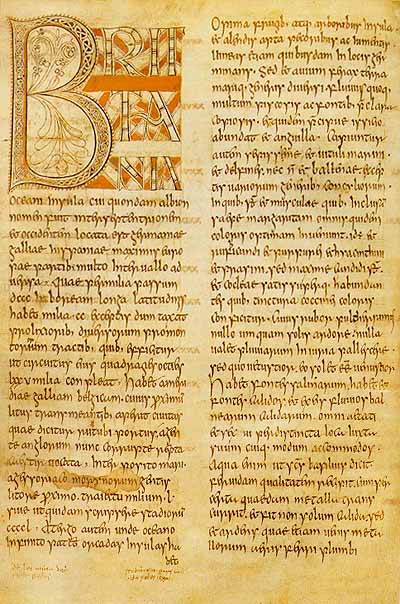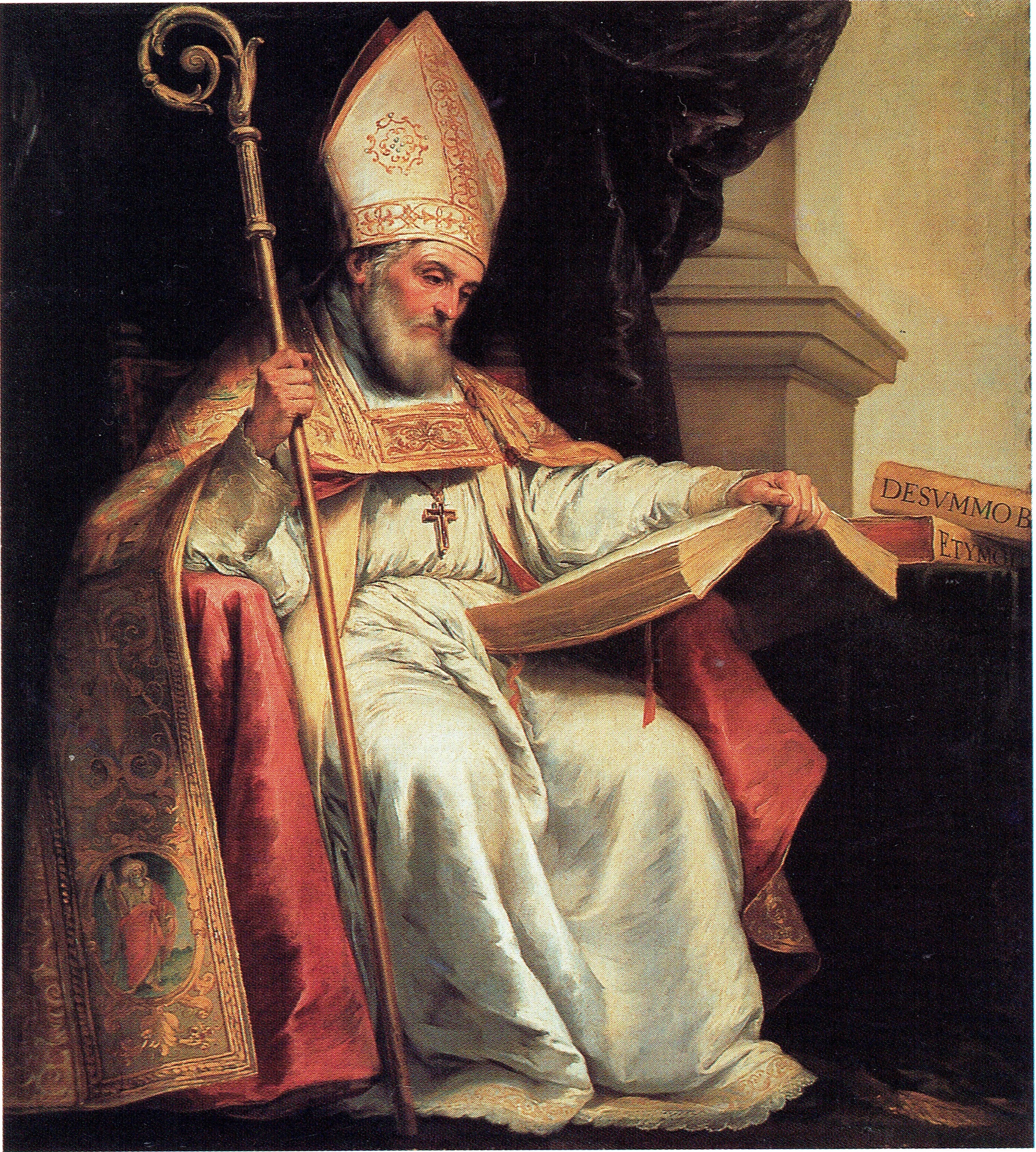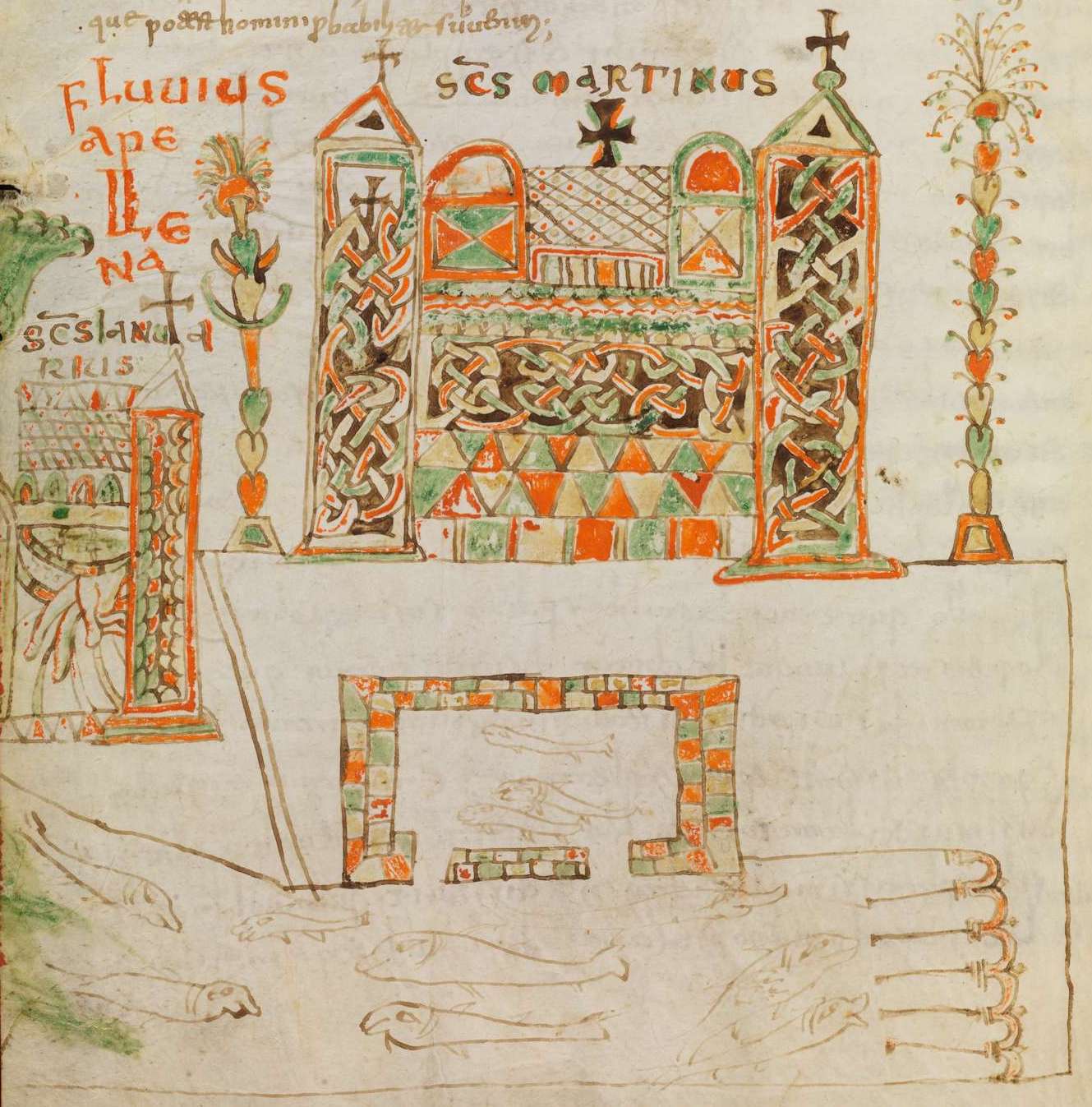|
Bede
Bede (; ; 672/326 May 735), also known as Saint Bede, Bede of Jarrow, the Venerable Bede, and Bede the Venerable (), was an English monk, author and scholar. He was one of the most known writers during the Early Middle Ages, and his most famous work, '' Ecclesiastical History of the English People'', gained him the title "The Father of English History". He served at the monastery of St Peter and its companion monastery of St Paul in the Kingdom of Northumbria of the Angles. Born on lands belonging to the twin monastery of Monkwearmouth–Jarrow in present-day Tyne and Wear, England, Bede was sent to Monkwearmouth at the age of seven and later joined Abbot Ceolfrith at Jarrow. Both of them survived a plague that struck in 686 and killed the majority of the population there. While Bede spent most of his life in the monastery, he travelled to several abbeys and monasteries across the British Isles, even visiting the archbishop of York and King Ceolwulf of Northumbria. ... [...More Info...] [...Related Items...] OR: [Wikipedia] [Google] [Baidu] |
Ecclesiastical History Of The English People
The ''Ecclesiastical History of the English People'' (), written by Bede in about AD 731, is a history of the Christian Churches in England, and of England generally; its main focus is on the growth of Christianity. It was composed in Latin, and is believed to have been completed in 731 when Bede was approximately 59 years old. It is considered one of the most important original references on Anglo-Saxon history, and according to some scholars has played a key role in the development of an English national identity. Overview The , or ''An Ecclesiastical History of the English People'', is Bede's best-known work, completed in about 731. The first of the five books begins with some geographical background and then sketches the history of England, beginning with Julius Caesar's invasion in 55 BC. A brief account of Christianity in Roman Britain, including the martyrdom of St Alban, is followed by the story of Augustine's mission to England in 597, which brought Christianity to the ... [...More Info...] [...Related Items...] OR: [Wikipedia] [Google] [Baidu] |
Kingdom Of Northumbria
Northumbria () was an early medieval Heptarchy, kingdom in what is now Northern England and Scottish Lowlands, South Scotland. The name derives from the Old English meaning "the people or province north of the Humber", as opposed to the Southumbria, people south of the Humber, Humber Estuary. What was to become Northumbria started as two kingdoms, Deira in the south and Bernicia in the north. Conflict in the first half of the seventh century ended with the murder of the last king of Deira in 651, and Northumbria was thereafter unified under Bernician kings. At its height, the kingdom extended from the Humber, Peak District and the River Mersey on the south to the Firth of Forth on the north. Northumbria ceased to be an independent kingdom in the mid-tenth century when Deira was conquered by the Danelaw, Danes and formed into the Kingdom of York. The rump Earl of Northumbria, Earldom of Bamburgh maintained control of Bernicia for a period of time; however, the area north of R ... [...More Info...] [...Related Items...] OR: [Wikipedia] [Google] [Baidu] |
Jarrow
Jarrow ( or ) is a town in South Tyneside in the county of Tyne and Wear, England. Historically in County Durham, it is on the south bank of the River Tyne, about from the east coast. The 2011 census area classed Hebburn and the Boldons as part of the town, it had a population of 43,431. It is home to the southern portal of the Tyne Tunnel and east of Newcastle upon Tyne. In the eighth century, St Paul's Monastery in Jarrow (now Monkwearmouth–Jarrow Abbey) was the home of the Venerable Bede, who is regarded as the greatest Anglo-Saxon scholar and the father of English history. The town is part of the historic County Palatine of Durham. From the middle of the 19th century until 1935, Jarrow was a centre for shipbuilding, and was the starting point of the Jarrow March against unemployment in 1936. History Toponymy Jarrow's name is first recorded in the 8th century. It derives from the Gyrwe, an Anglian tribe that lived here. The Gyrwe's name means "fen dwellers", perh ... [...More Info...] [...Related Items...] OR: [Wikipedia] [Google] [Baidu] |
Gregory The Great
Pope Gregory I (; ; – 12 March 604), commonly known as Saint Gregory the Great (; ), was the 64th Bishop of Rome from 3 September 590 until his death on 12 March 604. He is known for instituting the first recorded large-scale mission from Rome, the Gregorian mission, to convert the then largely pagan Anglo-Saxons to Christianity. Gregory is also well known for his writings, which were more prolific than those of any of his predecessors as pope. The epithet Saint Gregory the Dialogist has been attached to him in Eastern Christianity because of his ''Dialogues (Pope Gregory I), Dialogues''. English translations of Eastern texts sometimes list him as Gregory "Dialogos" from the Greek (''dialogos'', conversation), or the Anglo-Latinate equivalent "Dialogus". He is the second of the three Popes listed in the ''Annuario Pontificio'' with the title "the Great", alongside Popes Pope Leo I, Leo I and Pope Nicholas I, Nicholas I. A Roman senator's son and himself the prefect of Rome at ... [...More Info...] [...Related Items...] OR: [Wikipedia] [Google] [Baidu] |
Doctor Of The Church
Doctor of the Church (Latin: ''doctor'' "teacher"), also referred to as Doctor of the Universal Church (Latin: ''Doctor Ecclesiae Universalis''), is a title given by the Catholic Church to saints recognized as having made a significant contribution to theology or doctrine through their research, study, or writing. , the Catholic Church has named 37 Doctors of the Church. Of these, the 18 who died before the East-West Schism, Great Schism of 1054 are also held in high esteem by the Eastern Orthodox Church, although it does not use the formal title ''Doctor of the Church''. Among the 37 recognised Doctors, 28 are from the West and nine from the East; four are women and thirty-three are men; one is an abbess, three are nuns, and one is a tertiary associated with a religious order; two are popes, 19 are bishops, twelve are priests, and one is a deacon; and 27 are from Europe, three are from Africa, and seven are from Asia. More Doctors (twelve) lived in the fourth century than any o ... [...More Info...] [...Related Items...] OR: [Wikipedia] [Google] [Baidu] |
Durham Cathedral
Durham Cathedral, formally the , is a Church of England cathedral in the city of Durham, England. The cathedral is the seat of the bishop of Durham and is the Mother Church#Cathedral, mother church of the diocese of Durham. It also contains the shrines of the Anglo-Saxons, Anglo-Saxon saints Cuthbert and Bede. There are daily Church of England services at the cathedral, and it received 727,367 visitors in 2019. It is a grade I listed building and forms part of the Durham Castle and Cathedral World Heritage Site. The cathedral is the successor to the Anglo-Saxon Lindisfarne Priory, which was established but abandoned in 875 in the face of Viking Age, Viking raids. The monks settled at Chester-le-Street from 882 until 995, when they moved to Durham. The cathedral remained a monastery until it was Dissolution of the monasteries, dissolved in 1541, since when it has been governed by a Dean of Durham, dean and Chapter (religion), chapter. The cathedral precinct formed part of Durham ... [...More Info...] [...Related Items...] OR: [Wikipedia] [Google] [Baidu] |
Pope Leo XIII
Pope Leo XIII (; born Gioacchino Vincenzo Raffaele Luigi Pecci; 2March 181020July 1903) was head of the Catholic Church from 20 February 1878 until his death in July 1903. He had the fourth-longest reign of any pope, behind those of Peter the Apostle, Pius IX (his immediate predecessor), and Pope John Paul II, John Paul II. Born in Carpineto Romano, near Rome, Leo XIII is well known for his intellectualism and his attempts to define the position of the Catholic Church with regard to modern thinking. In his 1891 Papal encyclical, encyclical ''Rerum novarum'', Pope Leo outlined the Workers rights, rights of workers to a fair wage, Occupational safety and health, safe working conditions, and the formation of trade unions, while affirming the rights to property and Market economy, free enterprise, opposing both Atheism, atheistic socialism and ''laissez-faire'' capitalism. With that encyclical, he became popularly called the "Social Pope" and the "Pope of the Workers", also having cr ... [...More Info...] [...Related Items...] OR: [Wikipedia] [Google] [Baidu] |
Tyne And Wear
Tyne and Wear () is a Ceremonial counties of England, ceremonial county in North East England. It borders Northumberland to the north and County Durham to the south, and the largest settlement is the city of Newcastle upon Tyne. The county is largely urbanised, with a population of 1.14 million in 2021. After Newcastle, the largest settlements are the city of Sunderland, Gateshead, and South Shields. Nearly all of the county's settlements belong to the Tyneside or Wearside conurbations, the latter of which extends into County Durham. For local government purposes Tyne and Wear comprises five metropolitan boroughs: Metropolitan Borough of Gateshead, Gateshead, Newcastle upon Tyne, City of Sunderland, Sunderland, North Tyneside and South Tyneside. The borough councils collaborate through the North East Combined Authority, which also includes Durham County Council and Northumberland County Council. The county was created in 1974 from south-east Northumberland and north-east County ... [...More Info...] [...Related Items...] OR: [Wikipedia] [Google] [Baidu] |
Cassiodorus
Magnus Aurelius Cassiodorus Senator (c. 485 – c. 585), commonly known as Cassiodorus (), was a Christian Roman statesman, a renowned scholar and writer who served in the administration of Theodoric the Great, king of the Ostrogoths. ''Senator'' was part of his surname, not his rank. He also founded a monastery, Vivarium (or "Castellum"), where he worked extensively the last three decades of his life. Life Cassiodorus was born at Scylletium, near present-day Catanzaro in the Calabria region of Italy, into a family of Syrian origin. His ancestry included some of the most prominent ministers of the state extending back several generations. His great-grandfather held a command in the defense of the coasts of southern Italy from Vandal sea-raiders in the middle of the fifth century; his grandfather appears in a Roman embassy to Attila the Hun, and his father (who bore the same name) served as '' comes sacrarum largitionum'' and '' comes rerum privatarum'' to Odovacer and ... [...More Info...] [...Related Items...] OR: [Wikipedia] [Google] [Baidu] |
Augustine
Augustine of Hippo ( , ; ; 13 November 354 – 28 August 430) was a theologian and philosopher of Berber origin and the bishop of Hippo Regius in Numidia, Roman North Africa. His writings deeply influenced the development of Western philosophy and Western Christianity, and he is viewed as one of the most important Church Fathers of the Latin Church in the Patristic Period. His many important works include '' The City of God'', '' On Christian Doctrine'', and '' Confessions''. According to his contemporary, Jerome of Stridon, Augustine "established anew the ancient Faith". In his youth he was drawn to the Manichaean faith, and later to the Hellenistic philosophy of Neoplatonism. After his conversion to Christianity and baptism in 386, Augustine developed his own approach to philosophy and theology, accommodating a variety of methods and perspectives. Believing the grace of Christ was indispensable to human freedom, he helped formulate the doctrine of original sin and m ... [...More Info...] [...Related Items...] OR: [Wikipedia] [Google] [Baidu] |
General Roman Calendar
The General Roman Calendar (GRC) is the liturgy, liturgical calendar that indicates the dates of celebrations of saints and Sacred mysteries, mysteries of the Lord (Jesus Christ) in the Roman Rite of the Catholic Church, wherever this liturgical rite is in use. These celebrations are a fixed annual date, or occur on a particular day of the week. Examples are the Feast of the Baptism of the Lord in January and the Feast of Christ the King in November. Other dates relate to the date of Easter. Examples are the celebrations of the Sacred Heart of Jesus and the Immaculate Heart of Mary. Description National calendars of the Roman Rite, National and diocesan calendars, including that of the Diocese of Rome itself as well as the calendars of religious institutes and even of continents, add other saints and mysteries or transfer the celebration of a particular saint or mystery from the date assigned in the General Calendar to another date. These liturgical calendars indicate the de ... [...More Info...] [...Related Items...] OR: [Wikipedia] [Google] [Baidu] |
Beda College
The Pontifical Beda College () is a Catholic seminary in Rome. It was founded as the ''Collegio Ecclesiastico'' at the Palazzo dei Convertendi in 1852 by Pope Pius IX and is intended for older men, often convert clergymen, wishing to prepare for the priesthood. History This college was moved in 1854 to the English College to accommodate a larger number of clergymen from England who had joined the Roman Catholic Church from other Christian denominations and wished to prepare for the Catholic priesthood. They came for only four years, because they were seen to have significant experience already. Here the college became known as the ''Collegio Pio''. It also included lifelong Catholics drawn to the priesthood later in life, and priests studying for post-graduate degrees in Rome. Pope Leo XIII issued a new constitution in 1898 and placed the college under the patronage of Bede, the eighth-century Anglo-Saxon monk and scholar. Edward Henry Howard bequeathed to the two colleges h ... [...More Info...] [...Related Items...] OR: [Wikipedia] [Google] [Baidu] |







